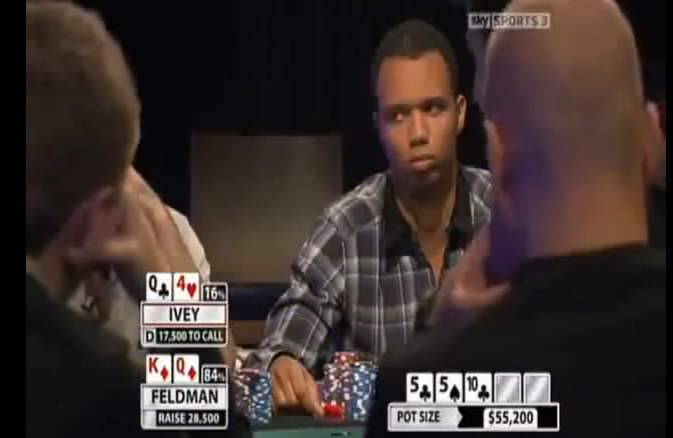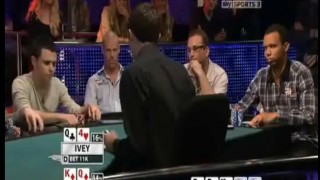Hand of the Week: Peak Ivey Gives Feldman a Master Class

-
T&Cs Apply | Play Responsibly | GambleAware
18+ | Play Responsibly | T&C Apply
-
T&Cs Apply | Play Responsibly | GambleAware
T&Cs Apply | Play Responsibly | GambleAware
- Fact Checked by: PokerListings
- Last updated on: March 9, 2025 · 4 minutes to read
There are countless hands you can dig up that illuminate why Phil Ivey is (was?) the best poker player in the world.
Our Hand of the Week this week is one of them.
Ivey shows us one of his best tricks – how to steal the pot without a hand when your opponent’s range is weak.
That opponent in this case is British player Andrew Feldman, who pays for his blasphemous mistake of messing with the king at his peak.
Flop to River
This hand come from back in 2011 when High Stakes Poker and Full Tilt still existed. The game is the Full Tilt Million Dollar Cash Game and the table is stacked with high-profile pros.
Tom Dwan, Peter Jetten, Ilari Sahamies, Patrik Antonius and Mike Matusow all occupy seats but they’re just spectators here as Ivey and Feldman are our protagonists.
The blinds are $300/$600/$100 so before any cards are dealt there’s already $1,700 in the pot. Feldman has $98,700 in front of him which is the shorter stack, thus defining the effective stacks.
When it’s folded to him Feldman raises to $2,000 from middle position. Two players on his left fold and on the button Ivey sits with
Ivey re-raises to $7,000. The blinds fold but Feldman stays in the hand. With $15,700 in the pot and $91,700 effective stacks, they go to a flop.
Feldman checks and Ivey bets $11,000. Feldman then raises to $28,500 and Ivey calls. There’s now $72,900 in the pot and effective stacks are $63,200.
The turn is the Feldman checks, Ivey bets $27,000 and Feldman folds his
He had the better hand but he simply got outplayed by his opponent. Ivey wins a pot of $99,700 with Queen-high and it puts a very tiny smile on his face. Enjoy watching!
Hand Analysis
It’s always worth watching Phil Ivey take an opponent to school, but even if it looks like magic it’s really just very rational poker thinking.

Pre-flop, he raises.
Pre-flop Feldman raises like he has numerous times before. Ivey has obviously recognized his aggressive style so doesn’t need much to put Feldman to the test.
He’s risking $7,000 to put himself into a very comfortable position post-flop. If the blinds or Feldman don’t re-raise, indicating a very strong hand, he has two big advantages if his 3-bet gets called:
- 1) The opponent’s range is weak.
- 2) He has position on all streets.
A C-Bet Seems Credible
The flop is T-5-5 with two clubs and that’s a flop that almost never helps anyone. That means the pre-flop situation hasn’t changed much.
Feldman’s range is still pretty weak and mainly has Broadway cards and middle or low pairs in it. Ivey’s range is much stronger by comparison.
He can have all the premium hands including pocket aces, whereas Feldman has capped his range by flat-calling the 3-bet.
If Feldman had aces or kings out of position against Phil Ivey he would’ve definitely raised again.
When Feldman checks Ivey tries to win the pot with a c-bet, as his opponent has probably not hit the flop. Also, a c-bet seems credible and in line with his betting story.
Stake.US Poker
T&Cs Apply | Play Responsibly | GambleAware
18+ | Play Responsibly | T&C Apply
The Implausible Raise
Ivey bets about two-thirds of the pot and Feldman raises to $28,500.
What could Feldman have here to raise with? Would he do that with a pair of tens?
Certainly he’d want his opponent to stay in if so. But, on the other hand, there are almost no other hands that Feldman could play like this and that loses him a lot of credibility.
There are basically two sets of hands that Feldman can have in this spot.
1) Good hands like A-T, K-T, 9-9, 8-8
These hands would often be the best but they wouldn’t raise the flop as they could only get called by better. So these hands would turn themselves into bluffs.
There is a chance that he has A-5s and decides to play it fast, but that’s almost the only hand he could raise with.
2) Semi-bluffs like two clubs, gutshots or complete bluffs
It makes sense to raise with any of these hands. From Feldman’s point of view he can try to make a move and steal the pot from a hand like A-J.
The problem is the guy on the other side is Phil Ivey. And Ivey has just realized the same thing.

Building.
World Class, Building to Masterpiece
He knows his opponent often has nothing so he doesn’t need much either. Still, it’s world class to float the check-raise on the flop and then exploit on the turn.
Ivey has to risk $17,500 — almost 20% of the effective stacks — but if Feldman leads out on the turn again he’d have to fold.
The next move is Ivey’s highlight of the day. The 8♠ on the turn is very unlikely to help anybody so Ivey could put Feldman all-in to exert maximum pressure.
But his special class shows in the way he optimizes his chance-risk ratio. Ivey played the hand perfectly anyway but this ridiculously small bet of $27,900 is a masterpiece.
He knows the bet is big enough to beat bluffs and, in the rare case where Feldman has a monster, he can still save $36,000.

“You’re not a bad poker player there, buddy.”
Feldman, on the other hand, has to give up the pot grudgingly. And then live with the nagging feeling that his opponent didn’t have much either.
Conclusion
Feldman messes with Ivey at his peak and learns a bitter lesson.
Ivey shows his brilliance by not only detecting the weakness of his opponent’s range but also exploiting with an outside the box play.
-
Stake.US Poker4.3
- Rakeback 5%
- $55 Stake Cash + 260K Gold Coins
T&Cs Apply | Play Responsibly | GambleAware
18+ | Play Responsibly | T&C Apply
-
Appeak Poker4.1
- 1,000 Chips Daily
- FREE 5,000 Chips
T&Cs Apply | Play Responsibly | GambleAware
T&Cs Apply | Play Responsibly | GambleAware
-
- 2,500 Gold Coins + 0.50 Sweeps Coins
T&Cs Apply | Play Responsibly | GambleAware
18+ | Play Responsibly | T&C Apply
-
- 150% up to 25 SC
T&Cs Apply | Play Responsibly | GambleAware
Terms & Conditions apply
-
- 5%
- 200% Gold on 1st Purchase
T&Cs Apply | Play Responsibly | GambleAware
Terms & Conditions apply
